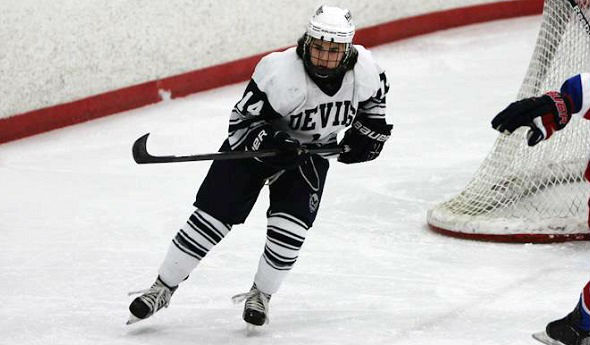
Roque Shines as Sault Ste Marie Surges
January 14, 2016
By Dennis Grall
Special for Second Half
SAULT STE. MARIE – Abby Roque has taken a somewhat unusual route to reach another high level of hockey.
 The Sault Ste. Marie High School senior, an accomplished international player on the women's side, is the only female playing on her school's boys hockey team, as she’s been each of her four seasons with the Blue Devils. She is the only girl to have ever played for the Sault, which is home to one of the top boys programs in the state.
The Sault Ste. Marie High School senior, an accomplished international player on the women's side, is the only female playing on her school's boys hockey team, as she’s been each of her four seasons with the Blue Devils. She is the only girl to have ever played for the Sault, which is home to one of the top boys programs in the state.
The Blue Devils, two-time MHSAA champions who finished second in the Division 3 playoffs in 2013 and 2014 and reached the Quarterfinals last year, are 10-4-1 this winter.
Roque, a forward who also plays on the team's top power play unit, has five goals and 14 assists. She has received a scholarship to play for the University of Wisconsin, which has one of the nation's premier women's hockey programs. The Badgers, coached by former Olympian and NHL star Mark Johnson, are currently ranked second in the country.
"It has really helped me see how college hockey will be," Roque said before a recent practice as the Blue Devils prepared for the Sault Lions Showcase this weekend and games against Dearborn Divine Child and Bloomfield Hills Brother Rice. Sault Ste. Marie is ranked No. 9 in Division 3 this week.
"It's been a good four years. It has helped me improve every single year," she added. "I've never been the best player on the team, but that has made me work hard to try to be the best player on the team.”
Last season, Roque was one of 15 girls who played on boys high school hockey teams in Michigan and earned Division 3 all-state second team honors.
She also played on the U.S. Women's Under-18 International Ice Hockey Federation world championship team that won gold in 2015.
"The speed of the guys high school game has helped me prepare for women's college hockey," she said.
While not as fast on the high school ice, Roque knows how to compensate against the boys. Asked for her primary strength, she said, "my smarts on the ice. The guys are very fast, they are very powerful. I have to make the right pass. My stick handling skills are good."
Those skills also give her a decided edge when she does play against other females, such as the IIHF world tourney, where she led the world juniors in face-offs. Even though checking is not allowed in the girls game, her experience in the more physical brand of boys hockey has helped provide a major advantage.
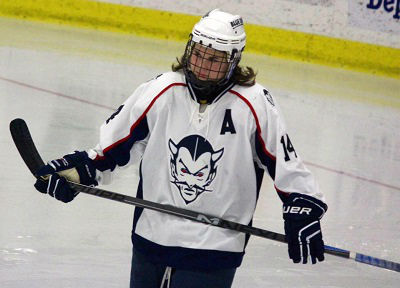 "I do enjoy the checking. The physical part of hockey is great," she said with a chuckle. "Girls hold the puck longer. Guys come at you (faster and harder) and you have to move the puck faster."
"I do enjoy the checking. The physical part of hockey is great," she said with a chuckle. "Girls hold the puck longer. Guys come at you (faster and harder) and you have to move the puck faster."
Getting knocked around in the corner in boys games is no problem. "I'm not intimidated by anyone on the ice," she said. "I've gotten stronger playing with the guys. I'm clearly not as strong, but I hold my own. It is all really just hockey to me at this point."
Her Sault coach, John Ferroni, said many opposing players and fans are not even aware there is a female on the ice. "She has definitely learned how to manage herself in the boys game," he said. "She is very competitive, sometimes even too competitive."
Indeed, she says, "I try to be the intimidating one on the ice."
That is not surprising since she has grown up with hockey a major part of her life. She began playing at age 4 and her father, Jim, is a former hockey coach at Lake Superior State University. Her uncle, Tom Bissett, is hockey coach at Grand Rapids Forest Hills Northern.
"If kids inherit things from their parents, she has inherited her dad's hockey IQ. She picked up the sport and has had a lot of hockey conversations with her father, and she comes from a hockey family," Ferroni said, noting her mother also has a strong athletic background.
Roque, who also has played golf and soccer and boasts 4.0 grade-point average taking advanced placement classes, said playing boys hockey was not a hard decision. She played in the strong Sault boys youth program from day one and realized the boys were the direction to take after playing girls hockey in the fall as an eighth grader.
"She always played with good hockey players, and they always accepted her as a girl," said Ferroni, in his fifth year as Sault coach. He said Roque "understands the game real well and made the commitment a long time ago. She is very dedicated to the sport."
Ferroni said Roque "has decent speed and decent quickness at the boys level. She is a strong skater and is very hard to knock off the puck. She is very elusive and always seems aware of what is going on around her."
That ability to see the game makes her "a playmaker without question" according to Ferroni. "She passes the puck extremely well; she has good, strong passing skills."
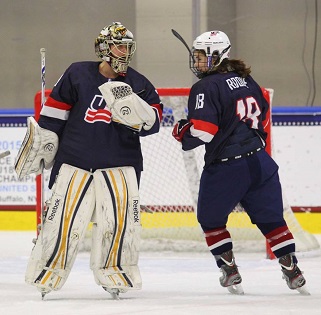 Ferroni admits he "had to look at a lot of things before taking her" on the team. After that process concluded, he said, "I knew she would be fine, but no way did I think she would rise to the level she has risen to. I didn't see that (second team all-state) coming."
Ferroni admits he "had to look at a lot of things before taking her" on the team. After that process concluded, he said, "I knew she would be fine, but no way did I think she would rise to the level she has risen to. I didn't see that (second team all-state) coming."
After checking out girls programs, Roque and Ferroni realized the Sault High School boys team would be the best path to follow. Ferroni said playing against other girls was not fast enough, and the puck movement among the boys was much better.
"We afforded her and gave her a great opportunity," Ferroni said. "She walked into a good, strong program as a freshman and was not just being a player, but was a real solid player. She definitely has raised the bar around here for girls.
"She has helped us as much as we have helped her."
Roque said Wisconsin "was the right fit for me. I loved everything about it, about Madison. Everything is about hockey. I just couldn't go anywhere else."
Roque also received scholarship offers from women's programs at North Dakota, Boston College and Boston University, among other schools.
This school year's participation figures will not be compiled until the spring, but about 250 girls total played on MHSAA boys teams in 2014-15.
 Denny Grall retired in 2012 after 39 years at the Escanaba Daily Press and four at the Green Bay Press-Gazette, plus 15 months for WLST radio in Escanaba; he served as the Daily Press sports editor from 1970-80 and again from 1984-2012. Grall was inducted into the Upper Peninsula Sports Hall of Fame in 2002 and serves as its executive secretary. E-mail him at [email protected] with story ideas for the Upper Peninsula.
Denny Grall retired in 2012 after 39 years at the Escanaba Daily Press and four at the Green Bay Press-Gazette, plus 15 months for WLST radio in Escanaba; he served as the Daily Press sports editor from 1970-80 and again from 1984-2012. Grall was inducted into the Upper Peninsula Sports Hall of Fame in 2002 and serves as its executive secretary. E-mail him at [email protected] with story ideas for the Upper Peninsula.
PHOTOS: (Top) Sault Ste. Marie's Abby Roque positions herself near the net during one of her team's games. (Middle) Roque is the first girl to play on the Sault's boys hockey team. (Below) Roque, here on her U.S. Under-18 team, brings international experience to the high school season. (Photos courtesy of the Sault Ste. Marie athletic department.)
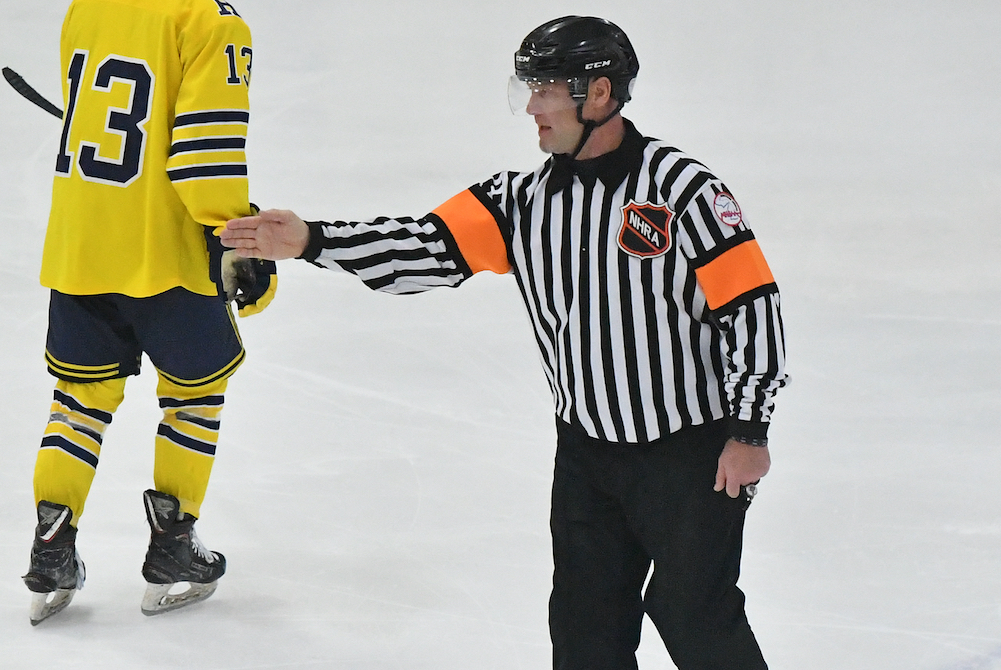
Retired NHL-er Back on Ice to Answer Call - By Making Them
By
Rob Kaminski
MHSAA benchmarks editor
March 16, 2023
The most accomplished skater on the ice during Friday’s triple-overtime MHSAA Division 1 Semifinal hockey thriller between Hartland and Brighton was not wearing the school colors of either team.
In front of a packed house at Plymouth’s USA Hockey Arena, referee Bryan Smolinski was in stripes, just like the rest of his officiating crew.
In his former life, he pulled on plenty of sweaters before lacing up the skates. That happens when one logs more than 1,000 games, tallies nearly 300 goals (274) and close to 400 assists (377) with eight teams spanning a 15-year playing career in the National Hockey League.
So, how did the 52-year-old former star player find himself on the ice last weekend as one of the referees for the pinnacle weekend of this high school season? Good question, even for the man known as “Smoke” during his playing days.
“I was working in youth development programs a few years back and reached out to some Michigan guys I had connections with about other ways to help the game,” Smolinski said. “I called Kevin May just to chat and asked, ‘Hey, how’s your reffing going?’ He said, ‘You know, we’re down a little bit,’ then said, ‘Why don’t you do it?’ I said, ‘Not a chance,’” Smolinski laughed.
Never Say Never
May persisted, imploring his friend to skate with him during a Fall league at Cranbrook in Bloomfield Hills. After eight weeks, once a week, Smolinski had a revelation.
“I’m like, ‘I’m kind of diggin’ this,’” Smolinski said “So, I did all the testing, and the educational part of it, and I really enjoyed it. I got with Danny (DiCristofaro) and his group, and he put me in as much as he could, and I really started to get my feet wet.”
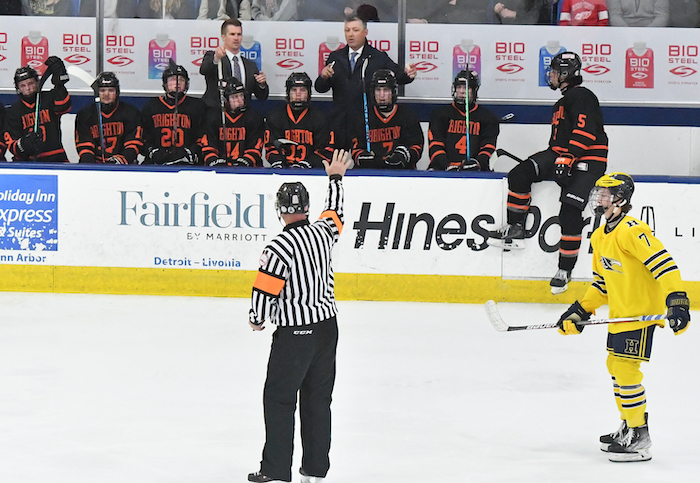 DiCristofaro is the assigner and referee-in-chief for the MHSAA’s Northeast Hockey Referees Association, and he has seen Smolinski’s growth first-hand.
DiCristofaro is the assigner and referee-in-chief for the MHSAA’s Northeast Hockey Referees Association, and he has seen Smolinski’s growth first-hand.
“Obviously he’s got great instincts and a feel for the game, along with a wealth of experience, all of which has allowed him to climb the ladder quickly,” said DiCristofaro. “It’s been a joy to watch his growth as an official.”
Fast forward to last Friday, and there were Smolinski and May sharing duties as referees during the MHSAA Semifinal with linesmen Michael Andrews and Thomas Robbins.
In between, there has been a learning curve that still continues, but the jump to officiating was not quite as daunting as his introduction to the NHL.
“I was scared to death. My first game was against Mario Lemieux. I’m in the old Boston Garden and now I’m playing against these guys and it’s their job, and they’re out there trying to make a living,” Smolinski recalled.
The emotions were not running nearly as frenzied for his first game as an MHSAA official, obviously, yet respect came in a different form.
“I couldn’t pick the puck up, I was breathing heavily; it was Kevin and me doing a two-man game in Brighton,” Smolinski recalled. “There were a few high-end kids playing, and I’m thinking, ‘I’m dying here.’ You know, there’s no training for that first time.”
What that experience did, however, was revitalize Smolinski in a new way. His playing career is well documented, not only in the NHL, but around Michigan. He enjoyed an honor-laden career at Michigan State University from 1989-93 before joining the Boston Bruins (who had drafted him three years earlier) at the end of the ’93 NHL campaign. Even after his final season, with Montreal in 2007-08, he stayed in the game via men’s leagues, or coaching his son, Max.
Smolinski and his wife, Julie, have three daughters: Ashtyn (22), Jojo (16) and Rylen (12), along with Max, whom dad coached for seven years including during a national championship run with a Little Caesars U15 team in 2019. Max, 19, is now playing collegiately at Rensselaer Polytechnic Institute.
So, for Smolinski, officiating offers a new chapter.
“Reffing brought back ... I wouldn’t say love of the game, because that’s always been there; it’s a different side of enjoying the game now. I have no horse in the race, my son’s off to college, my daughters are doing their thing; I wanted to find something new in the game,” Smolinski said. “I’ve coached, and I don’t want to do that. I found this, and I’ve stuck with it.”
Old College Ties
One of the great benefits of athletics at any level are the friendships made. For two kids who met in their first years on the MSU campus and forged a bond that lasts to this day, it’s amazing how their careers reached the pinnacle and have now come full circle.
Wes McCauley, an MSU teammate, is one of Smolinski’s best friends. After numerous years in the minor leagues, McCauley, like his friend, made it to the NHL. But McCauley made it as an official, working his first NHL game in 2003, when Smolinski was nearing the end of his playing career.
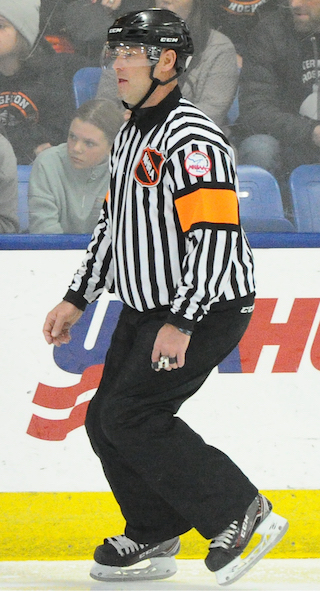 Their games lined up on just a few occasions in the NHL, and the two lobbied hard to have McCauley work Smolinski’s 1,000th career game in his final season with the Canadiens in 2007-08. The request, sadly, was denied by the league.
Their games lined up on just a few occasions in the NHL, and the two lobbied hard to have McCauley work Smolinski’s 1,000th career game in his final season with the Canadiens in 2007-08. The request, sadly, was denied by the league.
On the rare occasions when the friends did share the same ice, less than a handful by Smolinski’s count, it was McCauley who was forced to rebuff any attempts at fraternization. It’s just part of an official’s edict.
“For both of us, it was amazing; it was just great,” Smolinski said. “I’d say, ‘Hey man what’s up?’ and he says, ‘Can’t talk.’ I’m like, ‘What do you mean, we talk all the time.’ Again, he’s like, ‘Can’t talk, get away from me.’ You know, it was just business.”
McCauley then reached the 1,000-game plateau himself in 2018 and is still going strong as a regular selection for playoff duties with nine Stanley Cup Finals assignments, including last year.
So, it should have been natural for Smolinski to go to his old friend immediately for officiating pointers once he joined the ranks, right? Well, maybe not immediately.
“I talk to Wes all the time, but I actually hid it from him right out of the gate because I didn’t want to take his razzing. Eventually it got out, and he was loving it. He started sending me whistles and visors and pants,” Smolinski said, grinning. “And none of it fit, you know, because I’m older and fatter, and he’s so damn skinny. So, I still had to go out and get all new gear.”
Both Sides Now
Having been to the top of his profession, now moving to the other side of that same mountain that his friend McCauley scaled, the respect has grown for those blowing the whistle.
“The preparation for officiating is much more mental,” Smolinski said. “Way more rules oriented. You’re always trying to get away with things that you can as a player; now you have to police that.”
Smolinski has a distinct advantage.
“I know everything they’re trying to do because I’ve done it. I know where you’re going with the puck, I know what kind of breakout you’re trying to do,” Smolinski said. “I have all the instincts, now I just try to stay out of the way and not ruin their game. The most fun is watching the game develop and the ups and downs. For me to be out there and enjoy it with them, that’s the fun part.”
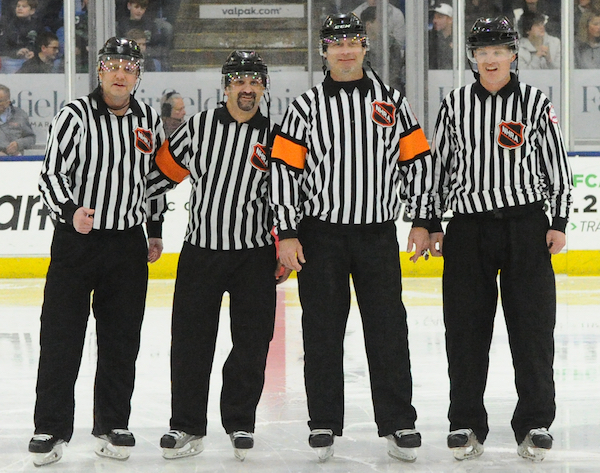 Those who have played hockey at any level have a built-in advantage should they consider the officiating avocation: the ability to skate. Unlike officiating in any other sport, skating is a prerequisite. This makes the pool limited, and almost solely composed of former players. Smolinski offers this advice.
Those who have played hockey at any level have a built-in advantage should they consider the officiating avocation: the ability to skate. Unlike officiating in any other sport, skating is a prerequisite. This makes the pool limited, and almost solely composed of former players. Smolinski offers this advice.
“I prefer sticking with high school because I think there’s more decorum, more administrative structure. Kids are playing for their schools, there’s loyalty there,” said Smolinski. “And there is more accountability. People need report to athletic directors and supervisors. Other levels can be more loosely governed, or a bit more maverick in nature. Moms and dads get involved more, coaches maybe know a little less,” said Smolinski.
He has, in fact, worked a handful of non-school games, and there’s a stark difference.
“I wanted to see what was going on, and I see it first-hand,” Smolinski said. “There are some crazy people and parents out there, and these guys are getting absolutely tortured. I’ve been tortured. There has to be a level of respect for what officials do. I think schools can rein that in a little more. All the guys I’ve met give up a lot of time and work hard because they love to do it and love the game.”
All sports need an assist from school administration and from those who once played the games to keep the officials recruitment moving in the right direction. People like Smolinski can help.
“He clearly doesn’t need to do this, and that’s what makes it so fantastic,” DiCristofaro said. “We need more people who have played – at any level – to do what he’s done and stay in the game as officials.”
Smolinski continues to promote the game in other ways as well. Currently, he is involved in the NHL’s Learn To Play initiative, which aims to inspire youth and welcome more families into the hockey community.
“We work hand-in-hand with the NHL Players Association for player development and industry growth,” Smolinski said. “Ages 5 to 9 are introduced to hockey, get head-to-toe gear and instruction, and meet some former players.”
The idea is to have fun first, which can translate into years and maybe even a lifetime in the sport. It’s a lifetime that has given Smolinski so much and continues to do so as he watches it unfold for others from his new vantage point.
PHOTOS (Top) MHSAA official Bryan Smolinski signals during Friday's Division 1 Semifinal between Brighton and Hartland. (2) Smolinski, a retired NHL standout, communicates with the Bulldogs' bench. (3) Smolinski keeps watch during game play. (4) Smolinski, third from left, with his crew: Michael Andrews, Kevin May and Thomas Robbins.

